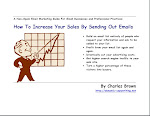Freelance Copywriter Secrets: Free Sample Marketing
Posted by Charles Brown at Thursday, September 21, 2006freelance copywriter, copywriting tips, white papers, rainmaking tips
As a freelance copywriter, I am always doing research. I study other people’s copy (there are some who say I am looking for ideas to steal, and they would be right), I read books on marketing, copywriting, advertising, web design, professional rainmaking, and all sorts of stuff that only a copywriting wonk would be interested in.
But I especially like doing research that involves free food.
There is a mall near my home that has a giant food court. Also known as a trap for the weak-willed dieter.
A favorite marketing ploy for some of the restaurants is to give away free samples of their food. I know this because I walked by one place that served Cajun food about six or seven times the other day, and they kept offering me small samples of food on a toothpick. I never said I was proud.
But after I was full of the free food, I sat down and watched how much business the various places were doing. Sure enough, the restaurants offering free samples were doing well over twice as much business as those that did not.
Why does this work? Well I believe there are two reasons.
The first reason is obvious, a free sample gives the hungry customer a taste of what the rest of the meal will be like and often that small taste is enough to make an undecided shopper choose that restaurant.
But the second reason is in my mind more interesting. In Robert Cialdini’s essential book, Influence: Science and Practice, he explains a powerful persuasion technique he calls The Law of Reciprocity. Reciprocity is the social obligation we feel when someone does something for us. When this happens, we are inclined to do something good back to that person.
Cialdini cites all kinds of research by social scientists and historians as examples of the Law of Reciprocity. In one study, a college professor sent out Christmas cards to a list of total strangers. The response he received was amazing. He received many, many cards back from people who had never met him and did not even ask who he was.
Another example Cialdini cites involves the religious cult, the Hare Krishna Society. For years in the 1970s and 80s they would approach people in public places, particularly airports, begging for donations. At first their results were pretty dismal, but then they changed tactics and started giving the strangers a free gift before asking for a donation.
The free gifts worked. Their donations skyrocketed until people became wise to their methods and started avoided them and airports enacted restrictions against their activities.
Cialdini also points to a study of waiters and waitresses. The study found that when they included a candy or mint with the customer’s bill, their tips were much higher than without the gift.
Another example was President Lyndon Johnson, known for his record of getting a truly awesome amount of legislation passed during his presidency. The reason was simple. In the many years prior to becoming JFK’s Vice President, Johnson had been a master of giving favors to his congressional colleagues.
Then when he became president, he had many lawmakers who were indebted to him and he was able to get favorable votes even from people who were philosophically opposed to his agenda.
OK, you are thinking, this is all very interesting but what does it have to do with copywriting? I’m glad you asked.
Recently I wrote an article called, Freelance Copywriter Secrets: Why 2-Step Ads Make More Sales, in which I explained that 2-step advertising produces much better results than one-shot ads in which the entire sale is attempted at one time.
The simple fact is that people like to receive free information and use it to help them make buying decisions. Just like the restaurants in the mall, the free information they receive from you is a sample of your work and demonstrates your expertise.
But also your free information product creates a connection between you and your potential customer. That connection is the Law of Reciprocity at work. Reciprocity says that, on balance, they are more likely to give their business to you than to someone else who sent them nothing.
In another recent article, Freelance Copywriter Secrets: 7 Copywriting Tips For Giving Free Information, I also showed the many ways you as a marketer can make free information products available. For example, a law firm can’t very well give would-be clients a “free sample” in the form of representing them for a free trial, or a free divorce.
But that same firm can send out a white paper to business owners on how to avoid liability, what to do if you think a dispute might turn into a lawsuit, how to preserve evidence and other matters directly relevant to business clients.
How would this firm market this white paper? Well it could put an ad in a local magazine that did not promote the firm itself as much as the free information. It could also conduct a seminar for business owners. Regardless of the means used, the point of any promotion would be the availability of the free white paper and the benefits of reading it.
Just like giving away free samples at the food court.
Now, if you'll pardon me. I'm going back to the mall, I'm feeling hungry again.
freelance copywriter, copywriting tips, white papers, rainmaking tips



0 comments:
Post a Comment